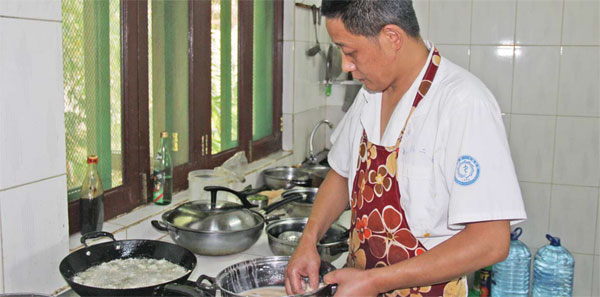Chef helps doctors feel at home

Local ingredients given a Chinese twist for Wuxi medical team
An old Chinese saying goes: Even a clever housewife cannot cook a meal without rice. But sometimes, that's not exactly true.
Just ask Gu Pinggen, chef for one of the medical teams dispatched from China's Jiangsu province to provide services in Zanzibar, a semi-autonomous archipelago that's part of Tanzania. The Jiangsu group, the 26th dispatched from the province, has one team in Zanzibar's main island and another in Pemba Island, where Gu is stationed.
| Gu Pinggen is a chef for a China-supported medical team in Zanzibar. Provided to China Daily |
Before arriving in Pemba, Gu had been a chef for nearly 30 years at Wuxi No 2 People's Hospital.
Wuxi is a prosperous city in East China between the provincial capital of Nanjing and Shanghai. It's known as a city of "fish and rice", and people there enjoy many kinds of vegetables and meats.
The team includes six doctors from Wuxi No 2 People's Hospital, one doctor from Wuxi No 4 People's Hospital and one doctor from Wuxi Children's Hospital.
When the medical team arrived in Zanzibar in June 2015, they discovered an unfamiliar environment. While Zanzibar is an alluring international tourist destination with beautiful beaches, Gu says what he could find in the local market was mainly limited to tomatoes, potatoes and onions, in addition to some beef and fish.
"As all the members are from Wuxi, they love to eat vegetables with green leaves," he said.
Gu realized if the food didn't agree with the team, it would be difficult for them to stay on and provide medical services for the local people.
Gu had, in fact, prepared for his assignment in Zanzibar. He took with him several books on cooking different cuisines. He went to visit restaurants to learn how to produce bean curd before going to Zanzibar. He had done research on the internet.
But the limited selection available still surprised him.
Gradually, an idea came to his mind, to grow vegetables in unoccupied areas of their complex. With the help of other team members, they planted Chinese vegetables to bring a greater sense of familiarity to their diet.
He grew bean sprouts and even tried his hand at producing bean curd.
As a result, the variety of vegetables on their table increased and the team felt more at home on the island.
Gu says he also tries to use different ways to prepare meals. "I cannot stir-fry shredded beef every day," he says. "I try my best to bring in more variety." He slices and minces beef for different meals.
While most of the fish eaten in Wuxi is from lakes and rivers in the area, Zanzibar's location in the Indian Ocean means an abundance of seafood. Gu says he searched the web, then practiced some methods for preparing saltwater dishes. After several tries, tasty seafood was served to the team.
"When the meal is ready, I wait for the doctors to come back from the hospital," Gu says. "My happiest time is when I see the dishes are finished without any leftovers."
Gu's specialty in China was desserts, which makes it easy for him to prepare different cakes for breakfast so the team doesn't get tired of the same old thing.
"I am not a doctor. I cannot provide any medical service to the local people," he says. "But I dedicate my time and energy to the preparation for meals for my doctor colleagues."
It is, Gu says, his contribution to the welfare of the local people.
panzhongming@chinadaily.com.cn
(China Daily Africa Weekly 08/12/2016 page21)
Today's Top News
- Xi hears report from Macao SAR chief executive
- Xi hears report from HKSAR chief executive
- UN envoy calls on Japan to retract Taiwan comments
- Innovation to give edge in frontier sectors
- Sanctions on Japan's former senior official announced
- Xi stresses importance of raising minors' moral standards






























